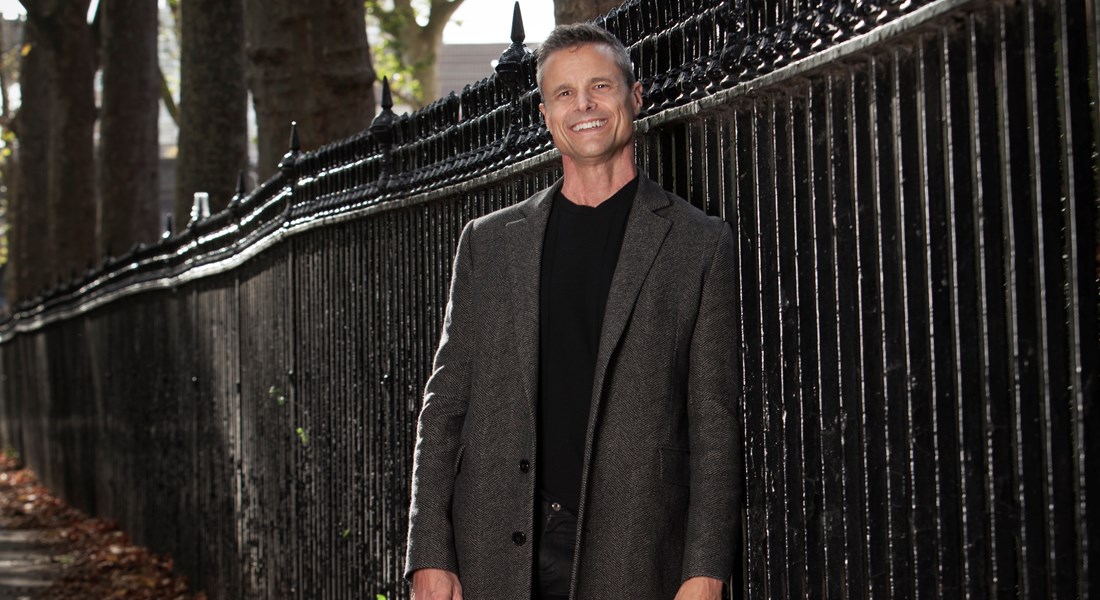Posted6 Jul 2017
- In
Meet Conductor David Charles Abell
David Charles Abell, a Mt. Airy native who has called London his home for the past two decades, is a renowned conductor known for his vast repertoire and ability to jump from opera to musical theatre to film and back again. As a Philly POPS fan favorite, Abell is no stranger to the local music scene, but he makes his Opera Philadelphia debut this fall leading Mozart's The Magic Flute. Before he takes the podium during our inaugural season-opening festival, O17, we asked Abell all about his diverse career and his performance bucket list.
Your professional repertoire is quite diverse - did you always set out to establish such a variety-filled career?
My childhood was filled with music. Although piano lessons at the age of six were not a success, I did enjoy singing in the local church choir. The Episcopal Church is perhaps the most theatrical denomination—of course that appealed to me! In my school orchestra, I played first the trumpet, then the viola. When I got to high school, I discovered musicals. I loved them. I acted, danced, sang, conducted, orchestrated and wrote songs. I even migrated to the violin in order to take on the title role in—you guessed it—Fiddler On the Roof.
Opera only registered on my radar when I went to Yale. I realized that operas tell compelling, passionate stories, just like musicals, but using different musical styles. Learning French, German, and Italian also opened up the opera world to me; that was the beginning of my lifelong love affair with the art form. It wasn’t an easy task to build my career. Impresarios and managers tend to pigeonhole conductors, and due to my TV exposure in connection with some large-scale shows, I became known as ‘that musicals guy.’ I had to fight to maintain my presence in the opera and concert worlds.

Of the many art forms that you work in, do you have a favorite? Why or why not?
I try to divide my time more or less evenly between opera, musicals and concerts. Recently I have been conducting more Pops concerts, which, to my surprise, I really love; I enjoy taking the audience on a journey of my own devising, hosting, choosing the repertoire and building musical excitement. I would love to add more symphonic music to my repertoire. That is, after all, where I started as a violist in my school orchestra. Now that I’m a bit more experienced, I think I am up to the challenge of Mahler symphonies and Debussy tone-poems.
However, my ultimate love is still opera. There’s nothing quite like the the ‘Gesamtkunstwerk,’ or ‘total work of art,’ as Wagner put it.
How is conducting a concert different than an opera, or an opera different than a film score?
For me, concerts, opera and film are all about storytelling, the main difference being the conductor’s degree of control. In a symphonic score, the conductor has great latitude to interpret the piece as he or she sees fit. Film, opera, and musical theatre require a more collaborative approach — the conductor needs to support the singers and complement the director’s vision for the piece.
Is there an opera, concert, or musical that you haven't worked on yet that you'd love to do?
Yes, of course! Wagner is in many ways the ultimate musical storyteller. I have conducted excerpts from his music-dramas, but never a complete work. The Ring is an ultimate goal.
I also love the operas of Benjamin Britten. I’ve conducted The Turn of the Screw and Albert Herring, and would love to do Peter Grimes or Death in Venice. I know Tchaikovsky’s later symphonies very well, and would love to get my teeth into them! His opera Eugene Onegin is in my schedule for next year; I’m looking forward to it.
And… there’s a superb musical by Frank Loesser, the composer of Guys and Dolls, called How to Succeed in Business Without Really Trying. It’s a razor-sharp satire of 1960s corporate life, and I’ve been obsessed with it ever since my parents saw the original Broadway production and brought home the LP. Having restored and published the orchestration to the musical Kiss Me, Kate a few years ago, I would love to make How to Succeed my next musicological and conducting project.
What do you think Suzanne Andrade and Barrie Kosky's production of The Magic Flute brings to this classic score?
Andrade and Kosky’s production is brilliant and innovative, in addition to being very, very funny. I love it. They made use of cutting-edge theatrical technology to re-imagine The Magic Flute as a 1920s-style silent movie. Although the projections are clever and witty, the production does not neglect the spiritual side of the piece. It offers spirituality with a light touch!
Leave your comment below.

 Facebook
Facebook Twitter
Twitter More
More